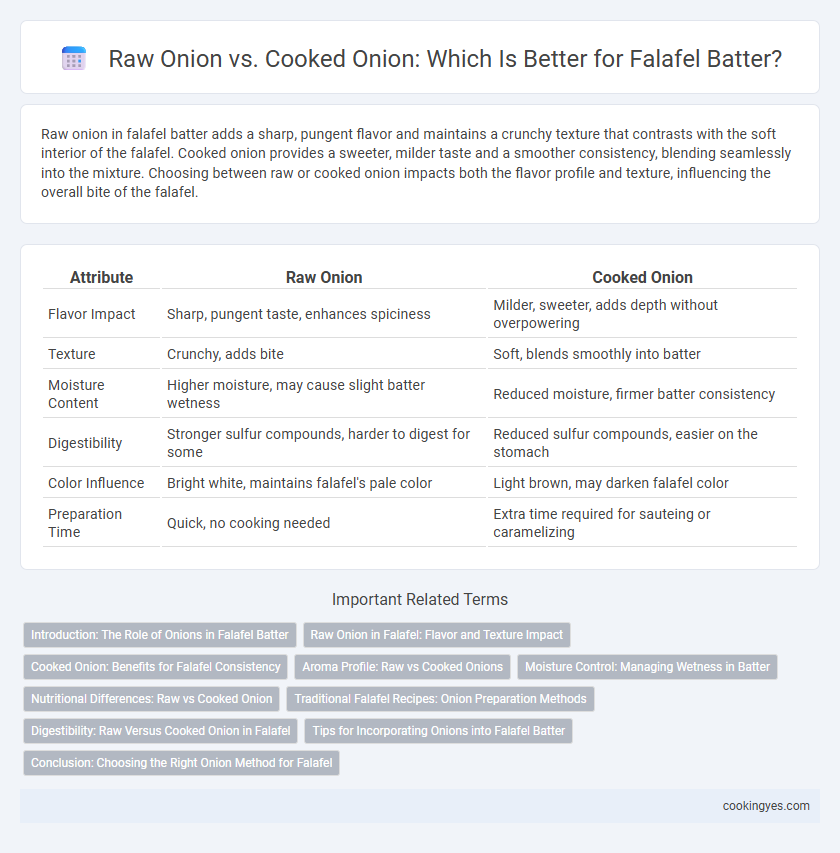Raw onion in falafel batter adds a sharp, pungent flavor and maintains a crunchy texture that contrasts with the soft interior of the falafel. Cooked onion provides a sweeter, milder taste and a smoother consistency, blending seamlessly into the mixture. Choosing between raw or cooked onion impacts both the flavor profile and texture, influencing the overall bite of the falafel.
Table of Comparison
| Attribute | Raw Onion | Cooked Onion |
|---|---|---|
| Flavor Impact | Sharp, pungent taste, enhances spiciness | Milder, sweeter, adds depth without overpowering |
| Texture | Crunchy, adds bite | Soft, blends smoothly into batter |
| Moisture Content | Higher moisture, may cause slight batter wetness | Reduced moisture, firmer batter consistency |
| Digestibility | Stronger sulfur compounds, harder to digest for some | Reduced sulfur compounds, easier on the stomach |
| Color Influence | Bright white, maintains falafel's pale color | Light brown, may darken falafel color |
| Preparation Time | Quick, no cooking needed | Extra time required for sauteing or caramelizing |
Introduction: The Role of Onions in Falafel Batter
Onions play a crucial role in falafel batter by enhancing flavor and moisture, with raw onions delivering a sharp, pungent taste that intensifies the overall profile. Cooked onions offer a milder, sweeter flavor that blends smoothly with chickpeas, resulting in a more balanced falafel texture. Choosing between raw and cooked onions impacts the final taste and consistency, shaping the falafel's unique culinary character.
Raw Onion in Falafel: Flavor and Texture Impact
Raw onion in falafel batter enhances the flavor with its sharp, pungent notes, adding a vibrant freshness that contrasts the earthy chickpeas. The crisp texture of raw onion contributes to a slight crunch, improving the overall bite and preventing the falafel from becoming too dense. Using raw onion also helps retain essential moisture, resulting in a juicier, more flavorful falafel.
Cooked Onion: Benefits for Falafel Consistency
Cooked onion enhances falafel batter by adding moisture that improves binding, resulting in a smoother, less crumbly texture. The caramelization process intensifies the onion's natural sweetness, enriching the overall flavor profile of the falafel. Cooking the onion also reduces its sharpness, creating a more balanced and palatable taste in the finished product.
Aroma Profile: Raw vs Cooked Onions
Raw onions contribute a sharp, pungent aroma to falafel batter, enhancing its bold and fresh character, while cooked onions offer a milder, sweeter scent that blends smoothly with spices. The enzymatic compounds in raw onions release a distinct sulfurous fragrance, intensifying the falafel's overall zest. Cooking onions caramelizes their sugars, creating a complex, mellow aroma that softens the punchiness of raw ingredients in the batter.
Moisture Control: Managing Wetness in Batter
Raw onion in falafel batter releases more moisture, which can make the mixture too wet and affect frying by causing oil splatter and soggy texture. Cooked onion reduces water content, helping maintain a firmer batter consistency ideal for crisp and evenly cooked falafel. Proper moisture control balances flavor while ensuring the falafel holds shape and achieves the perfect golden crust.
Nutritional Differences: Raw vs Cooked Onion
Raw onions in falafel batter offer higher levels of vitamin C and flavonoids, which diminish significantly when cooked. Cooking onions reduces their antioxidant capacity and water-soluble nutrients but enhances the availability of certain sulfur compounds that may benefit heart health. Incorporating raw onion maintains maximum nutrient density and crispness, while cooked onion favors a milder flavor and increased bioavailability of specific phytochemicals.
Traditional Falafel Recipes: Onion Preparation Methods
Traditional falafel recipes predominantly use raw onion in the batter to preserve its sharp, pungent flavor and moisture content, which helps bind the chickpeas. Raw onion also enhances the authentic texture and aromatic profile, providing a fresh bite that balances the spices in the mixture. Cooked onion, while milder and sweeter, can alter the falafel's texture and reduce the characteristic crispness, making it less common in classic preparations.
Digestibility: Raw Versus Cooked Onion in Falafel
Raw onions in falafel batter provide a sharp flavor but can be harder to digest and may cause bloating or discomfort for some individuals. Cooked onions break down the fibers and sugars, enhancing digestibility and reducing the risk of gastrointestinal irritation. Choosing cooked onions in falafel batter improves overall digestive comfort while maintaining a mild, sweet onion flavor.
Tips for Incorporating Onions into Falafel Batter
Raw onion in falafel batter provides a sharp, pungent flavor that enhances the overall taste, while cooked onion offers a sweeter, milder profile that can add depth. To balance moisture, finely grate raw onion and squeeze out excess liquid before mixing, preventing soggy falafel. Incorporating sauteed onions requires cooling them completely to avoid compromising the texture and binding properties of the batter.
Conclusion: Choosing the Right Onion Method for Falafel
Raw onion in falafel batter delivers a sharp, pungent flavor and crisp texture that enhances the traditional taste profile, while cooked onion offers a sweeter, milder flavor and softer consistency, contributing to a more subtle and cohesive blend. Selecting the right onion preparation depends on the desired flavor intensity and texture in the falafel; raw onion is best for a bold, crunchy bite, whereas cooked onion suits those seeking a smoother, mellow result. Balancing these elements ensures an optimized falafel that meets specific taste preferences and maintains the dish's authentic character.
Raw Onion vs Cooked Onion for Falafel Batter Infographic

 cookingyes.com
cookingyes.com